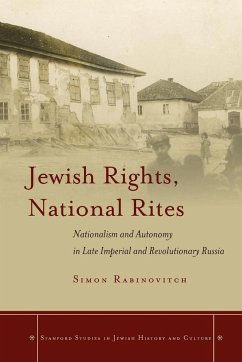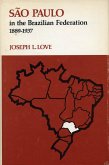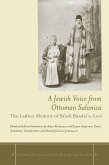Simon Rabinovitch
Jewish Rights, National Rites
Nationalism and Autonomy in Late Imperial and Revolutionary Russia
Simon Rabinovitch
Jewish Rights, National Rites
Nationalism and Autonomy in Late Imperial and Revolutionary Russia
- Gebundenes Buch
- Merkliste
- Auf die Merkliste
- Bewerten Bewerten
- Teilen
- Produkt teilen
- Produkterinnerung
- Produkterinnerung
In its full-color poster for elections to the All-Russian Jewish Congress in 1917, the Jewish People's Party depicted a variety of Jews in seeking to enlist the support of the broadest possible segment of Russia's Jewish population. It forsook neither traditional religious and economic life like the Jewish socialist parties, nor life in Europe like the Zionists. It embraced Hebrew, Yiddish, and Russian as fulfilling different roles in Jewish life. It sought the democratization of Jewish communal self-government and the creation of new Russian Jewish national-cultural and governmental…mehr
Andere Kunden interessierten sich auch für
![Escaping Hitler Escaping Hitler]() Eva Goldschmidt WymanEscaping Hitler52,99 €
Eva Goldschmidt WymanEscaping Hitler52,99 €![São Paulo in the Brazilian Federation, 1889-1937 São Paulo in the Brazilian Federation, 1889-1937]() Joseph L LoveSão Paulo in the Brazilian Federation, 1889-1937108,99 €
Joseph L LoveSão Paulo in the Brazilian Federation, 1889-1937108,99 €![The Rosicrucians, their rites and mysteries; with chapters on the ancient fire- and serpent-worshipers, and explanations of the mystic symbols represented in the monuments and talismans of the primeval philosophers The Rosicrucians, their rites and mysteries; with chapters on the ancient fire- and serpent-worshipers, and explanations of the mystic symbols represented in the monuments and talismans of the primeval philosophers]() Hargrave JenningsThe Rosicrucians, their rites and mysteries; with chapters on the ancient fire- and serpent-worshipers, and explanations of the mystic symbols represented in the monuments and talismans of the primeval philosophers27,99 €
Hargrave JenningsThe Rosicrucians, their rites and mysteries; with chapters on the ancient fire- and serpent-worshipers, and explanations of the mystic symbols represented in the monuments and talismans of the primeval philosophers27,99 €![A Jewish Voice from Ottoman Salonica A Jewish Voice from Ottoman Salonica]() A Jewish Voice from Ottoman Salonica166,99 €
A Jewish Voice from Ottoman Salonica166,99 €![The Plot The Plot]() Will EisnerThe Plot16,99 €
Will EisnerThe Plot16,99 €![Child of Christian Blood Child of Christian Blood]() Edmund LevinChild of Christian Blood27,99 €
Edmund LevinChild of Christian Blood27,99 €![The Lost Woodlands of Ancient Nasca The Lost Woodlands of Ancient Nasca]() David Beresford-JonesThe Lost Woodlands of Ancient Nasca118,99 €
David Beresford-JonesThe Lost Woodlands of Ancient Nasca118,99 €-
-
-
In its full-color poster for elections to the All-Russian Jewish Congress in 1917, the Jewish People's Party depicted a variety of Jews in seeking to enlist the support of the broadest possible segment of Russia's Jewish population. It forsook neither traditional religious and economic life like the Jewish socialist parties, nor life in Europe like the Zionists. It embraced Hebrew, Yiddish, and Russian as fulfilling different roles in Jewish life. It sought the democratization of Jewish communal self-government and the creation of new Russian Jewish national-cultural and governmental institutions. Most importantly, the self-named "folkists" believed that Jewish national aspirations could be fulfilled through Jewish autonomy in Russia and Eastern Europe more broadly. Ideologically and organizationally, this party's leadership would profoundly influence the course of Russian Jewish politics. Jewish Rights, National Rights provides a completely new interpretation of the origins of Jewish nationalism in Russia. It argues that Jewish nationalism, and Jewish politics generally, developed in a changing legal environment where the idea that nations had rights was beginning to take hold, and centered on the demand for Jewish autonomy in Eastern Europe. Drawing on numerous archives and libraries in the United States, Russia, Ukraine, and Israel, Simon Rabinovitch carefully reconstructs the political movement for Jewish autonomy, its personalities, institutions, and cultural projects. He explains how Jewish autonomy was realized following the February Revolution of 1917, and for the first time assesses voting patterns in November 1917 to determine the extent of public support for Jewish nationalism at the height of the Russian revolutionary period.
Hinweis: Dieser Artikel kann nur an eine deutsche Lieferadresse ausgeliefert werden.
Hinweis: Dieser Artikel kann nur an eine deutsche Lieferadresse ausgeliefert werden.
Produktdetails
- Produktdetails
- Verlag: Stanford University Press
- Seitenzahl: 392
- Erscheinungstermin: 29. Oktober 2014
- Englisch
- Abmessung: 235mm x 161mm x 26mm
- Gewicht: 649g
- ISBN-13: 9780804792493
- ISBN-10: 0804792496
- Artikelnr.: 41121238
- Herstellerkennzeichnung
- Libri GmbH
- Europaallee 1
- 36244 Bad Hersfeld
- gpsr@libri.de
- Verlag: Stanford University Press
- Seitenzahl: 392
- Erscheinungstermin: 29. Oktober 2014
- Englisch
- Abmessung: 235mm x 161mm x 26mm
- Gewicht: 649g
- ISBN-13: 9780804792493
- ISBN-10: 0804792496
- Artikelnr.: 41121238
- Herstellerkennzeichnung
- Libri GmbH
- Europaallee 1
- 36244 Bad Hersfeld
- gpsr@libri.de
Simon Rabinovitch is Assistant Professor in the Department of History at Boston University.
Contents and Abstracts
Introduction: Introduction
chapter abstract
The introduction presents the book's main themes and arguments. It
highlights the problems with defining nationalism and explains the
distinction between territorial sovereignty and nonterritorial autonomy. In
particular, the introduction emphasizes that the movement for Jewish
autonomy developed in the context of changing notions of political
sovereignty, decentralization, and federalism among the many national
groups of Eastern Europe and should be seen as a key element of both the
political campaign for Jewish individual and collective rights and the
cultural mission to create an alternative to religious traditionalism.
1Jewish Autonomy Imagined and Remembered
chapter abstract
This chapter explains how Simon Dubnov's political and historical theories
developed, with attention to his philosophical influences. It also
considers what Jewish autonomy meant historically and what actually
happened to Jewish autonomy in the Russian Empire in the nineteenth century
that led Dubnov and others to conclude that it should be revived. To
Dubnov, the only way to ensure Jewish national continuity in the future was
to rebuild the structure of Jewish autonomy along secular national lines,
with legal recognition from the state. Thus, the final section of this
chapter gives a view of how the significant legal and economic changes
affecting the Russian state and its inhabitants generally over the course
of the nineteenth century had altered Jewish society in particular.
2Jewish Autonomy and Europe's Changing Legal Landscape
chapter abstract
This chapter looks at the intellectual ferment in which ideas about
autonomism percolated among Jewish liberals and socialists. Jewish
socialists in Russia (and Russian Jewish socialists living abroad) looked
to Austria to see how the solutions proposed by Marxist jurists and legal
theorists about resolving the simmering disputes among that empire's many
nationalities might apply in Russia. On the other hand, Jewish liberals,
and the emerging Jewish intelligentsia in general, watched a wide-scale
experiment with local self-government in Russia and emulated the Russian
activists who sought to decentralize the empire and regenerate it. In sum,
socialists, liberals, and others who took up ideas about Jewish autonomy
adapted the prevailing intellectual trends to the Jewish situation in order
to argue that Jews in the Russian Empire must attain equality not just as
individuals but also as a group.
3Revolution, Nationality Politics, and the Legal Claim to Jewish Autonomy,
1905-7
chapter abstract
This chapter examines the role of the Russian revolution of 1905-7 in
politicizing Russian Jewry and bringing the issue of national rights to the
fore. During these revolutionary years and thereafter, politically active
Jews in Russia became convinced that if the Jews did not create a program
for nonterritorial Jewish autonomy, they would be left without the
autonomous rights of the other national minorities. Particular attention is
paid to the Union for Full Rights for the Jews of Russia and its debates
over national rights and autonomy. As new Jewish parties were founded and
others became legally allowed, the demand for Jewish national rights and
autonomy was adopted and adapted in various forms by all parties, such as
Zionists and socialists, who took up demands for Jewish national rights in
Russia alongside their demands for a Jewish state or proletarian
revolution.
4Jewish Culture and Autonomy in Reform and Retrenchment, 1907-14
chapter abstract
The decade leading up to World War I saw the creation of new autonomist
initiatives and growing nationalism across the Jewish political spectrum.
Jewish intellectuals, lawyers, and communal activists debated the nature of
the national idea and the ideal form of Jewish self-government. This
chapter analyzes the Jewish conferences, organizations, and publications
established during the interrevolutionary period that debated the "national
idea" and the possible means of implementing Jewish autonomy in Russia. As
this chapter explores, the debate over Jewish autonomy and community after
1907 both reflected and exacerbated existing divisions, not least those
between secular and religious definitions of the Jewish community and
between Yiddishists and their opponents. Most important, autonomist
projects of the period came to be based on the belief among highly
Russified Jewish intellectuals that autonomy should be constructed as a
bulwark against the pressures of assimilation on the Jewish public as a
whole.
5Jewish Refugees, Autonomy, and Transnational Politics During World War I,
1914-17
chapter abstract
As discussed in this chapter, Jewish political activists worked during
World War I to centralize Jewish communal organizations and establish local
and Russia-wide self-government. In the midst of war, widespread
anti-Jewish violence, and a refugee crisis, Jewish activists (like those of
other nationalities, including Russians) seized the opportunity to build
institutions that might actualize their national autonomy. The war created
the need for relief on a massive scale, and the organization of such relief
dramatically expanded the scope of activities undertaken by Jewish communal
organizations. Furthermore, the war provided both the governmental leeway
and urgent crisis necessary to centralize Jewish communal organizations
under a single body in St. Petersburg, controlled by a mix of the Jewish
financial elite and professional activists. Thus this chapter traces how
the war led to a form of proto-autonomism that laid the foundation for
genuine Jewish political autonomy.
6The Jewish Autonomist Movement and the Revolutions of 1917
chapter abstract
This chapter examines the institutional and political construction of
Jewish autonomy in Russia between the February and October Revolutions of
1917 and assesses the significance of the dramatic changes in Russian
society to the political views of the broader Jewish public. A
constitutional or a revolutionary state, socialism or liberalism,
individual civil rights versus national self-determination-all of these
were questions that turned organizing for the All-Russian Jewish Congress,
the general elections to the All-Russian Constituent Assembly, and the
local Jewish self-governments into battlegrounds between conflicting
ideological visions of the future. This chapter also pays particular
attention to Jewish voting in the wide array of Jewish and general
elections that took place over the course of 1917 and provide a rare
opportunity to assess how political ideas about nationalism, national
rights, autonomy, liberalism, and socialism made their way (or didn't) into
Jewish public opinion.
7Independent States and Unfulfilled Expectations
chapter abstract
As discussed in the book's final chapter, Jewish claims to national
minority rights made their way to the Versailles Conference's deliberations
and eventual treaties, and the question of collective Jewish rights was one
with considerable ramifications in the early Soviet Union. With the breakup
of the Russian and Austrian Empires, a Jew might find him- or herself
either a citizen of the Soviet Union, a state hostile to religious
traditionalism but eager to integrate Jews as individuals, or a citizen of
one of the new nation-states, which were indifferent to religious
traditionalism but reluctant to integrate Jews as full participants in
national politics. Only in Lithuania and Ukraine, and then only briefly,
did Jews find themselves in states willing to grant Jews their national
autonomy. All the post-Versailles states eventually squelched the one
political aspiration uniting the different strands of Jewish politics in
Russia and Eastern Europe: autonomy.
Conclusion: The Fate of Jewish Autonomism
chapter abstract
The conclusion attempts to give succinct answers to the following
questions: How did autonomism become the genesis of Jewish political
culture in late imperial and revolutionary Russia? How should one measure
Simon Dubnov's influence on the development of Jewish nationalism, broadly
speaking, and the assumption of Jewish demands for national rights
specifically? How can one assess autonomism's ultimate viability? Finally,
the conclusion suggests that autonomism was most successful not in Eastern
Europe but in Palestine before the establishment of the State of Israel.
Introduction: Introduction
chapter abstract
The introduction presents the book's main themes and arguments. It
highlights the problems with defining nationalism and explains the
distinction between territorial sovereignty and nonterritorial autonomy. In
particular, the introduction emphasizes that the movement for Jewish
autonomy developed in the context of changing notions of political
sovereignty, decentralization, and federalism among the many national
groups of Eastern Europe and should be seen as a key element of both the
political campaign for Jewish individual and collective rights and the
cultural mission to create an alternative to religious traditionalism.
1Jewish Autonomy Imagined and Remembered
chapter abstract
This chapter explains how Simon Dubnov's political and historical theories
developed, with attention to his philosophical influences. It also
considers what Jewish autonomy meant historically and what actually
happened to Jewish autonomy in the Russian Empire in the nineteenth century
that led Dubnov and others to conclude that it should be revived. To
Dubnov, the only way to ensure Jewish national continuity in the future was
to rebuild the structure of Jewish autonomy along secular national lines,
with legal recognition from the state. Thus, the final section of this
chapter gives a view of how the significant legal and economic changes
affecting the Russian state and its inhabitants generally over the course
of the nineteenth century had altered Jewish society in particular.
2Jewish Autonomy and Europe's Changing Legal Landscape
chapter abstract
This chapter looks at the intellectual ferment in which ideas about
autonomism percolated among Jewish liberals and socialists. Jewish
socialists in Russia (and Russian Jewish socialists living abroad) looked
to Austria to see how the solutions proposed by Marxist jurists and legal
theorists about resolving the simmering disputes among that empire's many
nationalities might apply in Russia. On the other hand, Jewish liberals,
and the emerging Jewish intelligentsia in general, watched a wide-scale
experiment with local self-government in Russia and emulated the Russian
activists who sought to decentralize the empire and regenerate it. In sum,
socialists, liberals, and others who took up ideas about Jewish autonomy
adapted the prevailing intellectual trends to the Jewish situation in order
to argue that Jews in the Russian Empire must attain equality not just as
individuals but also as a group.
3Revolution, Nationality Politics, and the Legal Claim to Jewish Autonomy,
1905-7
chapter abstract
This chapter examines the role of the Russian revolution of 1905-7 in
politicizing Russian Jewry and bringing the issue of national rights to the
fore. During these revolutionary years and thereafter, politically active
Jews in Russia became convinced that if the Jews did not create a program
for nonterritorial Jewish autonomy, they would be left without the
autonomous rights of the other national minorities. Particular attention is
paid to the Union for Full Rights for the Jews of Russia and its debates
over national rights and autonomy. As new Jewish parties were founded and
others became legally allowed, the demand for Jewish national rights and
autonomy was adopted and adapted in various forms by all parties, such as
Zionists and socialists, who took up demands for Jewish national rights in
Russia alongside their demands for a Jewish state or proletarian
revolution.
4Jewish Culture and Autonomy in Reform and Retrenchment, 1907-14
chapter abstract
The decade leading up to World War I saw the creation of new autonomist
initiatives and growing nationalism across the Jewish political spectrum.
Jewish intellectuals, lawyers, and communal activists debated the nature of
the national idea and the ideal form of Jewish self-government. This
chapter analyzes the Jewish conferences, organizations, and publications
established during the interrevolutionary period that debated the "national
idea" and the possible means of implementing Jewish autonomy in Russia. As
this chapter explores, the debate over Jewish autonomy and community after
1907 both reflected and exacerbated existing divisions, not least those
between secular and religious definitions of the Jewish community and
between Yiddishists and their opponents. Most important, autonomist
projects of the period came to be based on the belief among highly
Russified Jewish intellectuals that autonomy should be constructed as a
bulwark against the pressures of assimilation on the Jewish public as a
whole.
5Jewish Refugees, Autonomy, and Transnational Politics During World War I,
1914-17
chapter abstract
As discussed in this chapter, Jewish political activists worked during
World War I to centralize Jewish communal organizations and establish local
and Russia-wide self-government. In the midst of war, widespread
anti-Jewish violence, and a refugee crisis, Jewish activists (like those of
other nationalities, including Russians) seized the opportunity to build
institutions that might actualize their national autonomy. The war created
the need for relief on a massive scale, and the organization of such relief
dramatically expanded the scope of activities undertaken by Jewish communal
organizations. Furthermore, the war provided both the governmental leeway
and urgent crisis necessary to centralize Jewish communal organizations
under a single body in St. Petersburg, controlled by a mix of the Jewish
financial elite and professional activists. Thus this chapter traces how
the war led to a form of proto-autonomism that laid the foundation for
genuine Jewish political autonomy.
6The Jewish Autonomist Movement and the Revolutions of 1917
chapter abstract
This chapter examines the institutional and political construction of
Jewish autonomy in Russia between the February and October Revolutions of
1917 and assesses the significance of the dramatic changes in Russian
society to the political views of the broader Jewish public. A
constitutional or a revolutionary state, socialism or liberalism,
individual civil rights versus national self-determination-all of these
were questions that turned organizing for the All-Russian Jewish Congress,
the general elections to the All-Russian Constituent Assembly, and the
local Jewish self-governments into battlegrounds between conflicting
ideological visions of the future. This chapter also pays particular
attention to Jewish voting in the wide array of Jewish and general
elections that took place over the course of 1917 and provide a rare
opportunity to assess how political ideas about nationalism, national
rights, autonomy, liberalism, and socialism made their way (or didn't) into
Jewish public opinion.
7Independent States and Unfulfilled Expectations
chapter abstract
As discussed in the book's final chapter, Jewish claims to national
minority rights made their way to the Versailles Conference's deliberations
and eventual treaties, and the question of collective Jewish rights was one
with considerable ramifications in the early Soviet Union. With the breakup
of the Russian and Austrian Empires, a Jew might find him- or herself
either a citizen of the Soviet Union, a state hostile to religious
traditionalism but eager to integrate Jews as individuals, or a citizen of
one of the new nation-states, which were indifferent to religious
traditionalism but reluctant to integrate Jews as full participants in
national politics. Only in Lithuania and Ukraine, and then only briefly,
did Jews find themselves in states willing to grant Jews their national
autonomy. All the post-Versailles states eventually squelched the one
political aspiration uniting the different strands of Jewish politics in
Russia and Eastern Europe: autonomy.
Conclusion: The Fate of Jewish Autonomism
chapter abstract
The conclusion attempts to give succinct answers to the following
questions: How did autonomism become the genesis of Jewish political
culture in late imperial and revolutionary Russia? How should one measure
Simon Dubnov's influence on the development of Jewish nationalism, broadly
speaking, and the assumption of Jewish demands for national rights
specifically? How can one assess autonomism's ultimate viability? Finally,
the conclusion suggests that autonomism was most successful not in Eastern
Europe but in Palestine before the establishment of the State of Israel.
Contents and Abstracts
Introduction: Introduction
chapter abstract
The introduction presents the book's main themes and arguments. It
highlights the problems with defining nationalism and explains the
distinction between territorial sovereignty and nonterritorial autonomy. In
particular, the introduction emphasizes that the movement for Jewish
autonomy developed in the context of changing notions of political
sovereignty, decentralization, and federalism among the many national
groups of Eastern Europe and should be seen as a key element of both the
political campaign for Jewish individual and collective rights and the
cultural mission to create an alternative to religious traditionalism.
1Jewish Autonomy Imagined and Remembered
chapter abstract
This chapter explains how Simon Dubnov's political and historical theories
developed, with attention to his philosophical influences. It also
considers what Jewish autonomy meant historically and what actually
happened to Jewish autonomy in the Russian Empire in the nineteenth century
that led Dubnov and others to conclude that it should be revived. To
Dubnov, the only way to ensure Jewish national continuity in the future was
to rebuild the structure of Jewish autonomy along secular national lines,
with legal recognition from the state. Thus, the final section of this
chapter gives a view of how the significant legal and economic changes
affecting the Russian state and its inhabitants generally over the course
of the nineteenth century had altered Jewish society in particular.
2Jewish Autonomy and Europe's Changing Legal Landscape
chapter abstract
This chapter looks at the intellectual ferment in which ideas about
autonomism percolated among Jewish liberals and socialists. Jewish
socialists in Russia (and Russian Jewish socialists living abroad) looked
to Austria to see how the solutions proposed by Marxist jurists and legal
theorists about resolving the simmering disputes among that empire's many
nationalities might apply in Russia. On the other hand, Jewish liberals,
and the emerging Jewish intelligentsia in general, watched a wide-scale
experiment with local self-government in Russia and emulated the Russian
activists who sought to decentralize the empire and regenerate it. In sum,
socialists, liberals, and others who took up ideas about Jewish autonomy
adapted the prevailing intellectual trends to the Jewish situation in order
to argue that Jews in the Russian Empire must attain equality not just as
individuals but also as a group.
3Revolution, Nationality Politics, and the Legal Claim to Jewish Autonomy,
1905-7
chapter abstract
This chapter examines the role of the Russian revolution of 1905-7 in
politicizing Russian Jewry and bringing the issue of national rights to the
fore. During these revolutionary years and thereafter, politically active
Jews in Russia became convinced that if the Jews did not create a program
for nonterritorial Jewish autonomy, they would be left without the
autonomous rights of the other national minorities. Particular attention is
paid to the Union for Full Rights for the Jews of Russia and its debates
over national rights and autonomy. As new Jewish parties were founded and
others became legally allowed, the demand for Jewish national rights and
autonomy was adopted and adapted in various forms by all parties, such as
Zionists and socialists, who took up demands for Jewish national rights in
Russia alongside their demands for a Jewish state or proletarian
revolution.
4Jewish Culture and Autonomy in Reform and Retrenchment, 1907-14
chapter abstract
The decade leading up to World War I saw the creation of new autonomist
initiatives and growing nationalism across the Jewish political spectrum.
Jewish intellectuals, lawyers, and communal activists debated the nature of
the national idea and the ideal form of Jewish self-government. This
chapter analyzes the Jewish conferences, organizations, and publications
established during the interrevolutionary period that debated the "national
idea" and the possible means of implementing Jewish autonomy in Russia. As
this chapter explores, the debate over Jewish autonomy and community after
1907 both reflected and exacerbated existing divisions, not least those
between secular and religious definitions of the Jewish community and
between Yiddishists and their opponents. Most important, autonomist
projects of the period came to be based on the belief among highly
Russified Jewish intellectuals that autonomy should be constructed as a
bulwark against the pressures of assimilation on the Jewish public as a
whole.
5Jewish Refugees, Autonomy, and Transnational Politics During World War I,
1914-17
chapter abstract
As discussed in this chapter, Jewish political activists worked during
World War I to centralize Jewish communal organizations and establish local
and Russia-wide self-government. In the midst of war, widespread
anti-Jewish violence, and a refugee crisis, Jewish activists (like those of
other nationalities, including Russians) seized the opportunity to build
institutions that might actualize their national autonomy. The war created
the need for relief on a massive scale, and the organization of such relief
dramatically expanded the scope of activities undertaken by Jewish communal
organizations. Furthermore, the war provided both the governmental leeway
and urgent crisis necessary to centralize Jewish communal organizations
under a single body in St. Petersburg, controlled by a mix of the Jewish
financial elite and professional activists. Thus this chapter traces how
the war led to a form of proto-autonomism that laid the foundation for
genuine Jewish political autonomy.
6The Jewish Autonomist Movement and the Revolutions of 1917
chapter abstract
This chapter examines the institutional and political construction of
Jewish autonomy in Russia between the February and October Revolutions of
1917 and assesses the significance of the dramatic changes in Russian
society to the political views of the broader Jewish public. A
constitutional or a revolutionary state, socialism or liberalism,
individual civil rights versus national self-determination-all of these
were questions that turned organizing for the All-Russian Jewish Congress,
the general elections to the All-Russian Constituent Assembly, and the
local Jewish self-governments into battlegrounds between conflicting
ideological visions of the future. This chapter also pays particular
attention to Jewish voting in the wide array of Jewish and general
elections that took place over the course of 1917 and provide a rare
opportunity to assess how political ideas about nationalism, national
rights, autonomy, liberalism, and socialism made their way (or didn't) into
Jewish public opinion.
7Independent States and Unfulfilled Expectations
chapter abstract
As discussed in the book's final chapter, Jewish claims to national
minority rights made their way to the Versailles Conference's deliberations
and eventual treaties, and the question of collective Jewish rights was one
with considerable ramifications in the early Soviet Union. With the breakup
of the Russian and Austrian Empires, a Jew might find him- or herself
either a citizen of the Soviet Union, a state hostile to religious
traditionalism but eager to integrate Jews as individuals, or a citizen of
one of the new nation-states, which were indifferent to religious
traditionalism but reluctant to integrate Jews as full participants in
national politics. Only in Lithuania and Ukraine, and then only briefly,
did Jews find themselves in states willing to grant Jews their national
autonomy. All the post-Versailles states eventually squelched the one
political aspiration uniting the different strands of Jewish politics in
Russia and Eastern Europe: autonomy.
Conclusion: The Fate of Jewish Autonomism
chapter abstract
The conclusion attempts to give succinct answers to the following
questions: How did autonomism become the genesis of Jewish political
culture in late imperial and revolutionary Russia? How should one measure
Simon Dubnov's influence on the development of Jewish nationalism, broadly
speaking, and the assumption of Jewish demands for national rights
specifically? How can one assess autonomism's ultimate viability? Finally,
the conclusion suggests that autonomism was most successful not in Eastern
Europe but in Palestine before the establishment of the State of Israel.
Introduction: Introduction
chapter abstract
The introduction presents the book's main themes and arguments. It
highlights the problems with defining nationalism and explains the
distinction between territorial sovereignty and nonterritorial autonomy. In
particular, the introduction emphasizes that the movement for Jewish
autonomy developed in the context of changing notions of political
sovereignty, decentralization, and federalism among the many national
groups of Eastern Europe and should be seen as a key element of both the
political campaign for Jewish individual and collective rights and the
cultural mission to create an alternative to religious traditionalism.
1Jewish Autonomy Imagined and Remembered
chapter abstract
This chapter explains how Simon Dubnov's political and historical theories
developed, with attention to his philosophical influences. It also
considers what Jewish autonomy meant historically and what actually
happened to Jewish autonomy in the Russian Empire in the nineteenth century
that led Dubnov and others to conclude that it should be revived. To
Dubnov, the only way to ensure Jewish national continuity in the future was
to rebuild the structure of Jewish autonomy along secular national lines,
with legal recognition from the state. Thus, the final section of this
chapter gives a view of how the significant legal and economic changes
affecting the Russian state and its inhabitants generally over the course
of the nineteenth century had altered Jewish society in particular.
2Jewish Autonomy and Europe's Changing Legal Landscape
chapter abstract
This chapter looks at the intellectual ferment in which ideas about
autonomism percolated among Jewish liberals and socialists. Jewish
socialists in Russia (and Russian Jewish socialists living abroad) looked
to Austria to see how the solutions proposed by Marxist jurists and legal
theorists about resolving the simmering disputes among that empire's many
nationalities might apply in Russia. On the other hand, Jewish liberals,
and the emerging Jewish intelligentsia in general, watched a wide-scale
experiment with local self-government in Russia and emulated the Russian
activists who sought to decentralize the empire and regenerate it. In sum,
socialists, liberals, and others who took up ideas about Jewish autonomy
adapted the prevailing intellectual trends to the Jewish situation in order
to argue that Jews in the Russian Empire must attain equality not just as
individuals but also as a group.
3Revolution, Nationality Politics, and the Legal Claim to Jewish Autonomy,
1905-7
chapter abstract
This chapter examines the role of the Russian revolution of 1905-7 in
politicizing Russian Jewry and bringing the issue of national rights to the
fore. During these revolutionary years and thereafter, politically active
Jews in Russia became convinced that if the Jews did not create a program
for nonterritorial Jewish autonomy, they would be left without the
autonomous rights of the other national minorities. Particular attention is
paid to the Union for Full Rights for the Jews of Russia and its debates
over national rights and autonomy. As new Jewish parties were founded and
others became legally allowed, the demand for Jewish national rights and
autonomy was adopted and adapted in various forms by all parties, such as
Zionists and socialists, who took up demands for Jewish national rights in
Russia alongside their demands for a Jewish state or proletarian
revolution.
4Jewish Culture and Autonomy in Reform and Retrenchment, 1907-14
chapter abstract
The decade leading up to World War I saw the creation of new autonomist
initiatives and growing nationalism across the Jewish political spectrum.
Jewish intellectuals, lawyers, and communal activists debated the nature of
the national idea and the ideal form of Jewish self-government. This
chapter analyzes the Jewish conferences, organizations, and publications
established during the interrevolutionary period that debated the "national
idea" and the possible means of implementing Jewish autonomy in Russia. As
this chapter explores, the debate over Jewish autonomy and community after
1907 both reflected and exacerbated existing divisions, not least those
between secular and religious definitions of the Jewish community and
between Yiddishists and their opponents. Most important, autonomist
projects of the period came to be based on the belief among highly
Russified Jewish intellectuals that autonomy should be constructed as a
bulwark against the pressures of assimilation on the Jewish public as a
whole.
5Jewish Refugees, Autonomy, and Transnational Politics During World War I,
1914-17
chapter abstract
As discussed in this chapter, Jewish political activists worked during
World War I to centralize Jewish communal organizations and establish local
and Russia-wide self-government. In the midst of war, widespread
anti-Jewish violence, and a refugee crisis, Jewish activists (like those of
other nationalities, including Russians) seized the opportunity to build
institutions that might actualize their national autonomy. The war created
the need for relief on a massive scale, and the organization of such relief
dramatically expanded the scope of activities undertaken by Jewish communal
organizations. Furthermore, the war provided both the governmental leeway
and urgent crisis necessary to centralize Jewish communal organizations
under a single body in St. Petersburg, controlled by a mix of the Jewish
financial elite and professional activists. Thus this chapter traces how
the war led to a form of proto-autonomism that laid the foundation for
genuine Jewish political autonomy.
6The Jewish Autonomist Movement and the Revolutions of 1917
chapter abstract
This chapter examines the institutional and political construction of
Jewish autonomy in Russia between the February and October Revolutions of
1917 and assesses the significance of the dramatic changes in Russian
society to the political views of the broader Jewish public. A
constitutional or a revolutionary state, socialism or liberalism,
individual civil rights versus national self-determination-all of these
were questions that turned organizing for the All-Russian Jewish Congress,
the general elections to the All-Russian Constituent Assembly, and the
local Jewish self-governments into battlegrounds between conflicting
ideological visions of the future. This chapter also pays particular
attention to Jewish voting in the wide array of Jewish and general
elections that took place over the course of 1917 and provide a rare
opportunity to assess how political ideas about nationalism, national
rights, autonomy, liberalism, and socialism made their way (or didn't) into
Jewish public opinion.
7Independent States and Unfulfilled Expectations
chapter abstract
As discussed in the book's final chapter, Jewish claims to national
minority rights made their way to the Versailles Conference's deliberations
and eventual treaties, and the question of collective Jewish rights was one
with considerable ramifications in the early Soviet Union. With the breakup
of the Russian and Austrian Empires, a Jew might find him- or herself
either a citizen of the Soviet Union, a state hostile to religious
traditionalism but eager to integrate Jews as individuals, or a citizen of
one of the new nation-states, which were indifferent to religious
traditionalism but reluctant to integrate Jews as full participants in
national politics. Only in Lithuania and Ukraine, and then only briefly,
did Jews find themselves in states willing to grant Jews their national
autonomy. All the post-Versailles states eventually squelched the one
political aspiration uniting the different strands of Jewish politics in
Russia and Eastern Europe: autonomy.
Conclusion: The Fate of Jewish Autonomism
chapter abstract
The conclusion attempts to give succinct answers to the following
questions: How did autonomism become the genesis of Jewish political
culture in late imperial and revolutionary Russia? How should one measure
Simon Dubnov's influence on the development of Jewish nationalism, broadly
speaking, and the assumption of Jewish demands for national rights
specifically? How can one assess autonomism's ultimate viability? Finally,
the conclusion suggests that autonomism was most successful not in Eastern
Europe but in Palestine before the establishment of the State of Israel.








